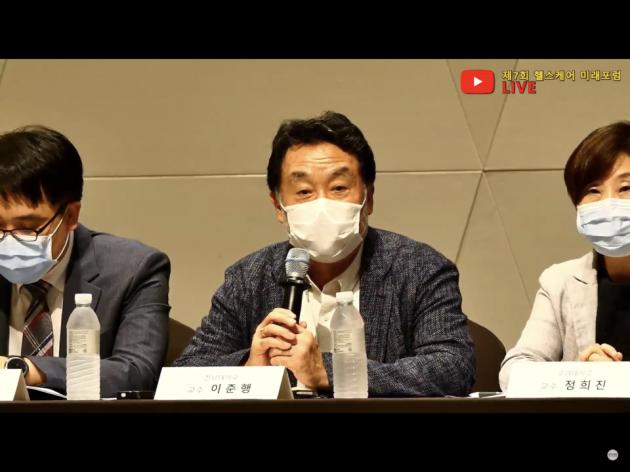Healthcare experts said the Korean government needs detailed strategies to introduce a Covid-19 vaccine.
The Korea Health Industry Development Institute (KHIDI) held the Healthcare Future Forum on the Covid-19 vaccine development status and strategies to secure the vaccine on Friday. Due to social distancing amid Covid-19, the KHIDI limited the number of in-person participation of the forum broadcast live on YouTube.
Muk Hyun-sang, CEO of the Korea Drug Development Fund (KDDF), went over the status of Covid-19 vaccine development around the world by the platform.
According to Muk, five Covid-19 vaccine candidates entered phase-3 clinical trials based on four platforms -- synthetic protein vaccine, nucleic acid vaccine, viral vector vaccine, and inactivated vaccine.Moderna and Pfizer began phase-3 studies on mRNA vaccines. AstraZeneca and Oxford University also embarked on a joint phase-3 study on a viral vector vaccine.
AstraZeneca reportedly set an estimated unit price for a Covid-19 vaccine at $8, Pfizer and BioNTech, around $40, and Modena, $50-60. Johnson & Johnson said it would not make a profit from a Covid-19 vaccine. AstraZeneca also reportedly said that it would supply a vaccine at no profit during the pandemic.
Muk said a Covid-19 vaccine would be priced between $8 and $60 in the global market, adding that the local price could change depending on the government’s strategy.

He emphasized that the government was seeking two goals simultaneously – developing a Korean-made Covid-19 and introducing a globally-developed vaccine. “The government has a strong will to complete a locally-made vaccine, from R&D investment to the drug approval and the stockpiling,” he said.
At the following debate, Professor Rhee Joon-haeng of Chonnam National University College of Medicine received a question from the floor that which vaccine should be introduced to the domestic market first.
“It is too early to judge now. But the U.S. government’s approach seems to be most clear because it supports all the vaccine candidates that may be effective,” he said.
Rhee predicted that he could conclude which vaccine would be most effective within two months.
He raised concerns about vaccine candidates' adverse drug events, saying the government needs a “central lab” to lead the vaccination.
Rhee took an example of the U.S., where a central lab helps businesses to take vaccinations. “This looks as of the government is offering benefits to a company. But this is a way of testing to monitor which vaccine is the best,” he said.
Professor Choi Won-seok of the Infectious Disease Department of Korea University College of Medicine said the government has to have different strategies in investment, purchase, and vaccination.
“A safety issue is likely to become a hurdle to vaccine purchase and decision for vaccination. Rather, it could negatively affect the vaccine strategies,” he said.
Choi went on to say that the government should make a condition that vaccination would not start unless the safety of the secured vaccines is guaranteed to make vaccine developers mass-produce them.
“The government’s investment and purchase should be aggressive, and vaccination, conservative,” he advised.
Also, th government needs a strategy for the effect of Covid-19 vaccination.
He said the initial quantity of the vaccines could hinge on the government’s strategy. “The government should prioritize order among stages such as maintaining the medical system, reducing the damage of moderate to severe patients, and preventing an outbreak,” he said.
Then, the government should make various scenarios to make the right decision according to the outcome of vaccine trials, he added.
Song Young-joo, vice president of Johnson and Johnson Korea, who attended the forum as the representative of the Korea Research-based Pharmaceutical Industry Association (KRPIA), said the government should make it clear how much it could allow drug companies to use “emergency use approval system” and give “immunity” in case of adverse events, to accelerate R&D of Covid-19 vaccine development.

